BABS Assignment: UK Housing Market Analysis 2009-2019
VerifiedAdded on 2023/01/10
|16
|3784
|52
Report
AI Summary
This report evaluates the UK housing market from 2009 to 2019, examining internal and external business environments. It analyzes house price changes, including average prices and regional variations, and identifies key economic determinants such as income, mortgage rates, and speculation. The report assesses the impact of government actions on the housing market during this period, including the effects of the global financial crisis. Furthermore, it determines the influence of COVID-19 on the UK housing market. The report provides a comprehensive overview of the factors affecting the housing sector and concludes with a summary of the key findings.
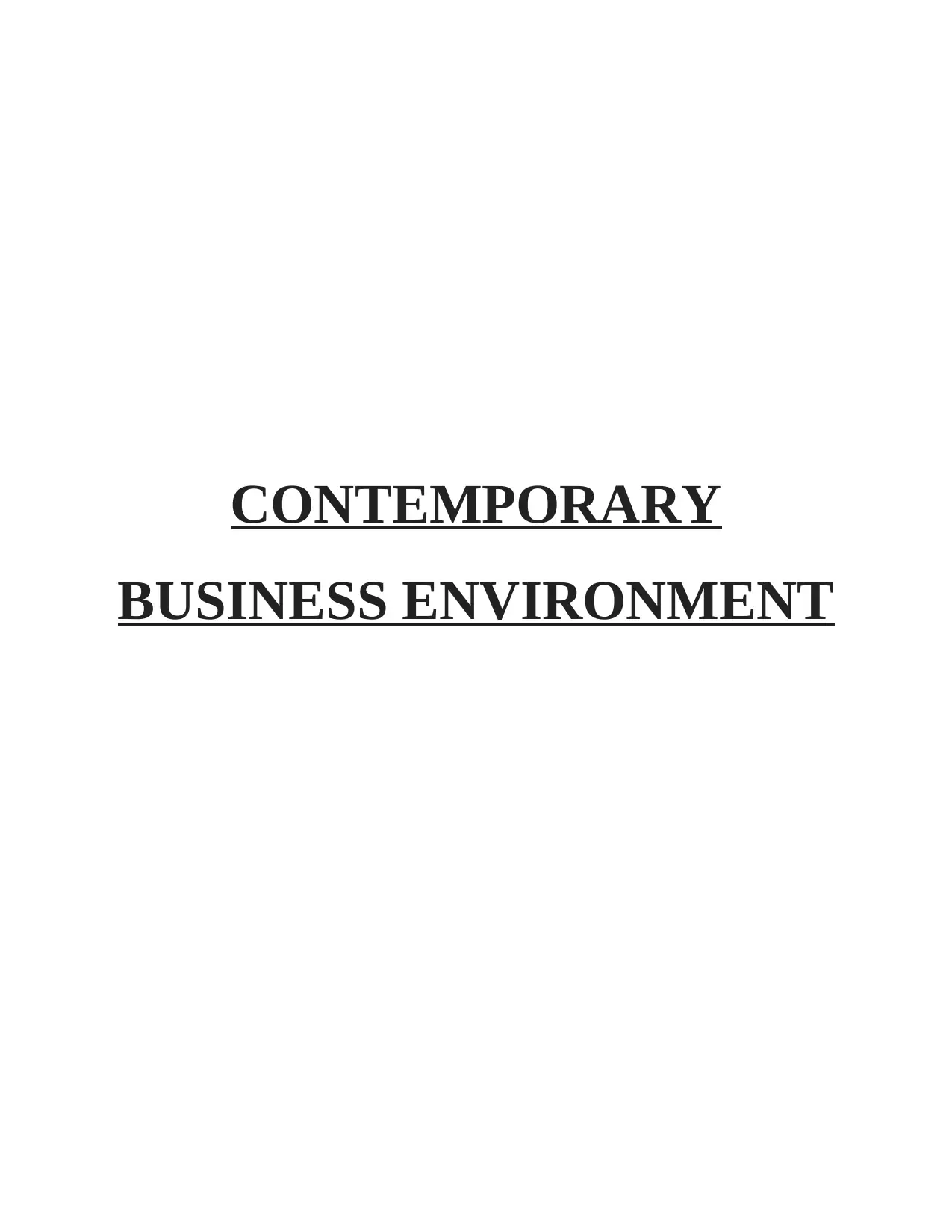
CONTEMPORARY
BUSINESS ENVIRONMENT
BUSINESS ENVIRONMENT
Paraphrase This Document
Need a fresh take? Get an instant paraphrase of this document with our AI Paraphraser
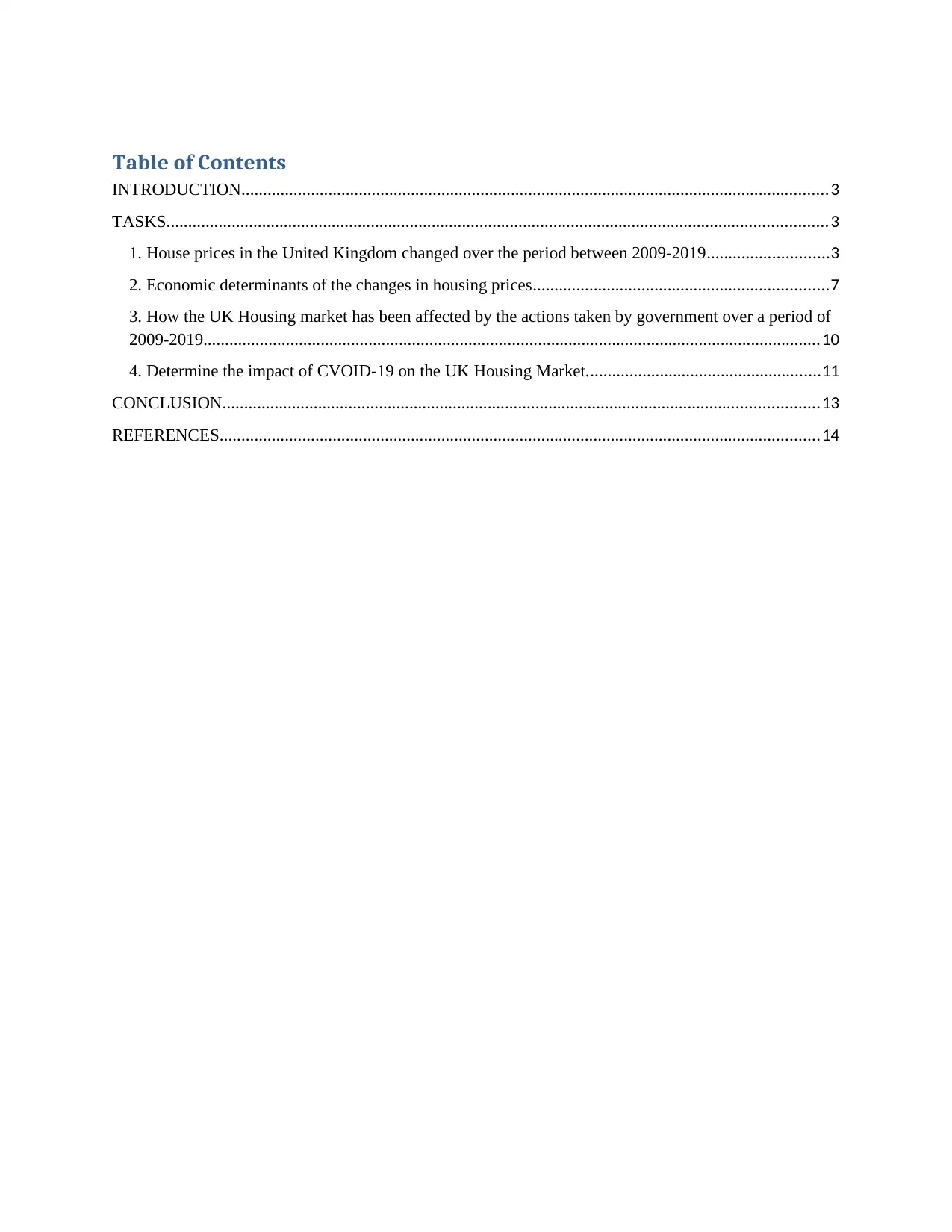
Table of Contents
INTRODUCTION.......................................................................................................................................3
TASKS........................................................................................................................................................3
1. House prices in the United Kingdom changed over the period between 2009-2019............................3
2. Economic determinants of the changes in housing prices....................................................................7
3. How the UK Housing market has been affected by the actions taken by government over a period of
2009-2019..............................................................................................................................................10
4. Determine the impact of CVOID-19 on the UK Housing Market......................................................11
CONCLUSION.........................................................................................................................................13
REFERENCES..........................................................................................................................................14
INTRODUCTION.......................................................................................................................................3
TASKS........................................................................................................................................................3
1. House prices in the United Kingdom changed over the period between 2009-2019............................3
2. Economic determinants of the changes in housing prices....................................................................7
3. How the UK Housing market has been affected by the actions taken by government over a period of
2009-2019..............................................................................................................................................10
4. Determine the impact of CVOID-19 on the UK Housing Market......................................................11
CONCLUSION.........................................................................................................................................13
REFERENCES..........................................................................................................................................14
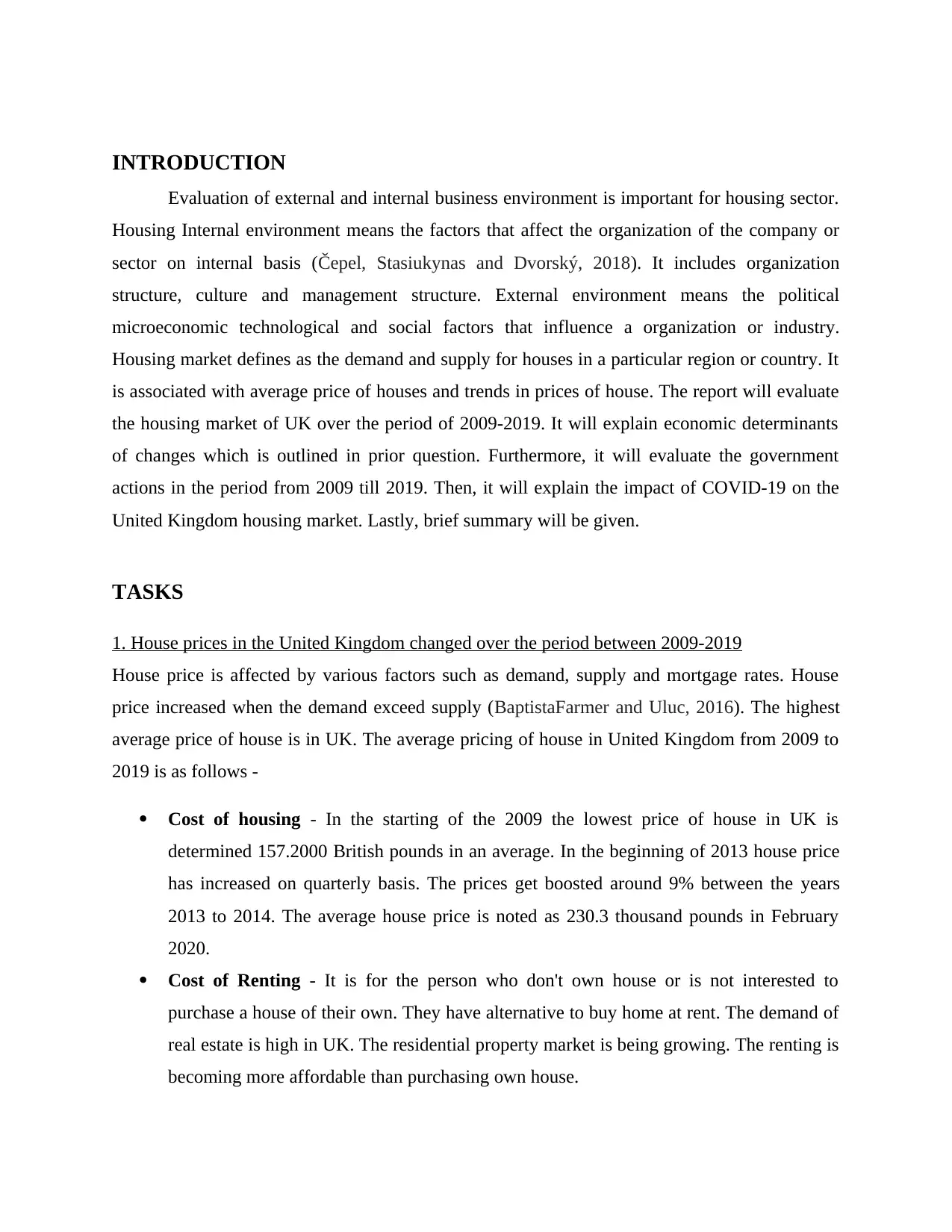
INTRODUCTION
Evaluation of external and internal business environment is important for housing sector.
Housing Internal environment means the factors that affect the organization of the company or
sector on internal basis (Čepel, Stasiukynas and Dvorský, 2018). It includes organization
structure, culture and management structure. External environment means the political
microeconomic technological and social factors that influence a organization or industry.
Housing market defines as the demand and supply for houses in a particular region or country. It
is associated with average price of houses and trends in prices of house. The report will evaluate
the housing market of UK over the period of 2009-2019. It will explain economic determinants
of changes which is outlined in prior question. Furthermore, it will evaluate the government
actions in the period from 2009 till 2019. Then, it will explain the impact of COVID-19 on the
United Kingdom housing market. Lastly, brief summary will be given.
TASKS
1. House prices in the United Kingdom changed over the period between 2009-2019
House price is affected by various factors such as demand, supply and mortgage rates. House
price increased when the demand exceed supply (BaptistaFarmer and Uluc, 2016). The highest
average price of house is in UK. The average pricing of house in United Kingdom from 2009 to
2019 is as follows -
Cost of housing - In the starting of the 2009 the lowest price of house in UK is
determined 157.2000 British pounds in an average. In the beginning of 2013 house price
has increased on quarterly basis. The prices get boosted around 9% between the years
2013 to 2014. The average house price is noted as 230.3 thousand pounds in February
2020.
Cost of Renting - It is for the person who don't own house or is not interested to
purchase a house of their own. They have alternative to buy home at rent. The demand of
real estate is high in UK. The residential property market is being growing. The renting is
becoming more affordable than purchasing own house.
Evaluation of external and internal business environment is important for housing sector.
Housing Internal environment means the factors that affect the organization of the company or
sector on internal basis (Čepel, Stasiukynas and Dvorský, 2018). It includes organization
structure, culture and management structure. External environment means the political
microeconomic technological and social factors that influence a organization or industry.
Housing market defines as the demand and supply for houses in a particular region or country. It
is associated with average price of houses and trends in prices of house. The report will evaluate
the housing market of UK over the period of 2009-2019. It will explain economic determinants
of changes which is outlined in prior question. Furthermore, it will evaluate the government
actions in the period from 2009 till 2019. Then, it will explain the impact of COVID-19 on the
United Kingdom housing market. Lastly, brief summary will be given.
TASKS
1. House prices in the United Kingdom changed over the period between 2009-2019
House price is affected by various factors such as demand, supply and mortgage rates. House
price increased when the demand exceed supply (BaptistaFarmer and Uluc, 2016). The highest
average price of house is in UK. The average pricing of house in United Kingdom from 2009 to
2019 is as follows -
Cost of housing - In the starting of the 2009 the lowest price of house in UK is
determined 157.2000 British pounds in an average. In the beginning of 2013 house price
has increased on quarterly basis. The prices get boosted around 9% between the years
2013 to 2014. The average house price is noted as 230.3 thousand pounds in February
2020.
Cost of Renting - It is for the person who don't own house or is not interested to
purchase a house of their own. They have alternative to buy home at rent. The demand of
real estate is high in UK. The residential property market is being growing. The renting is
becoming more affordable than purchasing own house.
⊘ This is a preview!⊘
Do you want full access?
Subscribe today to unlock all pages.

Trusted by 1+ million students worldwide
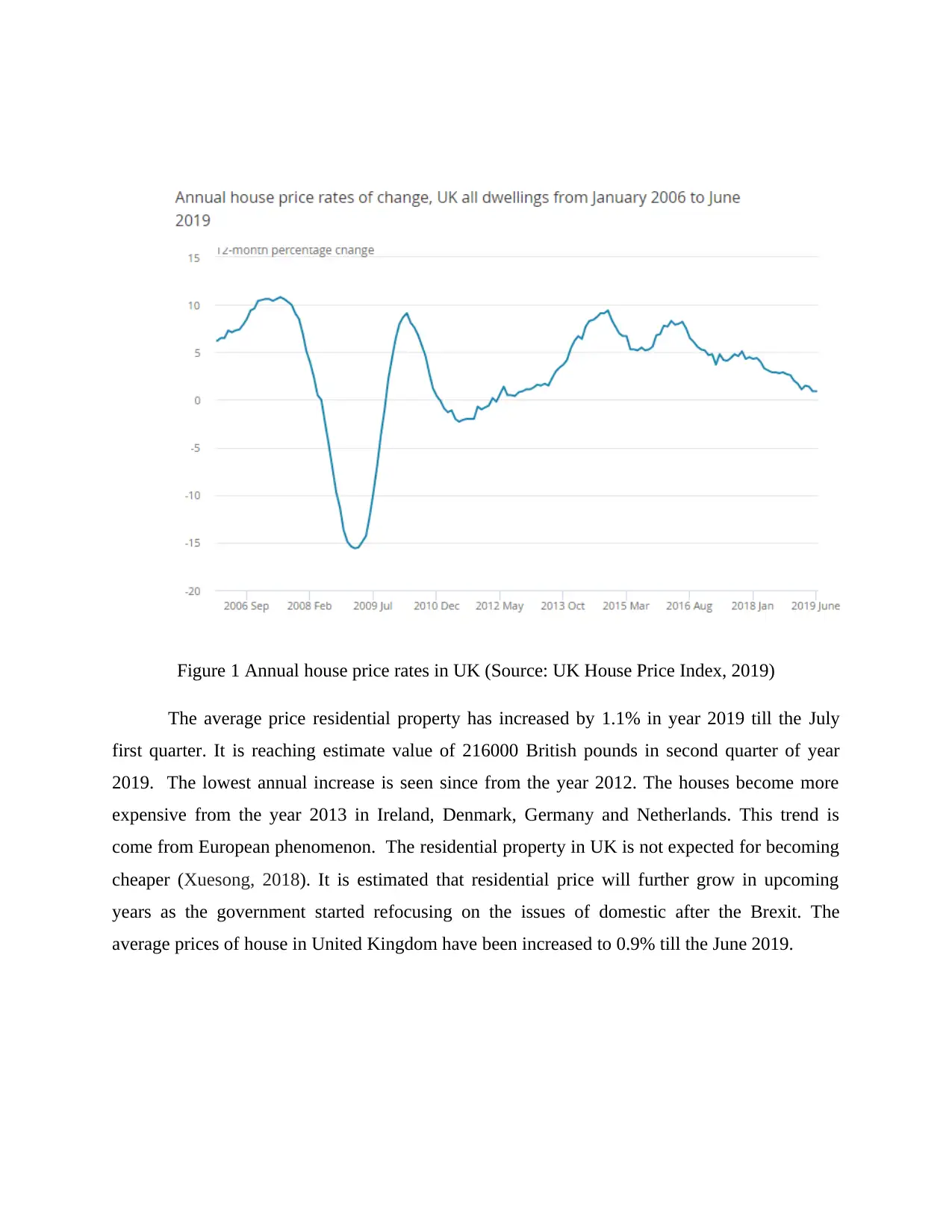
Figure 1 Annual house price rates in UK (Source: UK House Price Index, 2019)
The average price residential property has increased by 1.1% in year 2019 till the July
first quarter. It is reaching estimate value of 216000 British pounds in second quarter of year
2019. The lowest annual increase is seen since from the year 2012. The houses become more
expensive from the year 2013 in Ireland, Denmark, Germany and Netherlands. This trend is
come from European phenomenon. The residential property in UK is not expected for becoming
cheaper (Xuesong, 2018). It is estimated that residential price will further grow in upcoming
years as the government started refocusing on the issues of domestic after the Brexit. The
average prices of house in United Kingdom have been increased to 0.9% till the June 2019.
The average price residential property has increased by 1.1% in year 2019 till the July
first quarter. It is reaching estimate value of 216000 British pounds in second quarter of year
2019. The lowest annual increase is seen since from the year 2012. The houses become more
expensive from the year 2013 in Ireland, Denmark, Germany and Netherlands. This trend is
come from European phenomenon. The residential property in UK is not expected for becoming
cheaper (Xuesong, 2018). It is estimated that residential price will further grow in upcoming
years as the government started refocusing on the issues of domestic after the Brexit. The
average prices of house in United Kingdom have been increased to 0.9% till the June 2019.
Paraphrase This Document
Need a fresh take? Get an instant paraphrase of this document with our AI Paraphraser
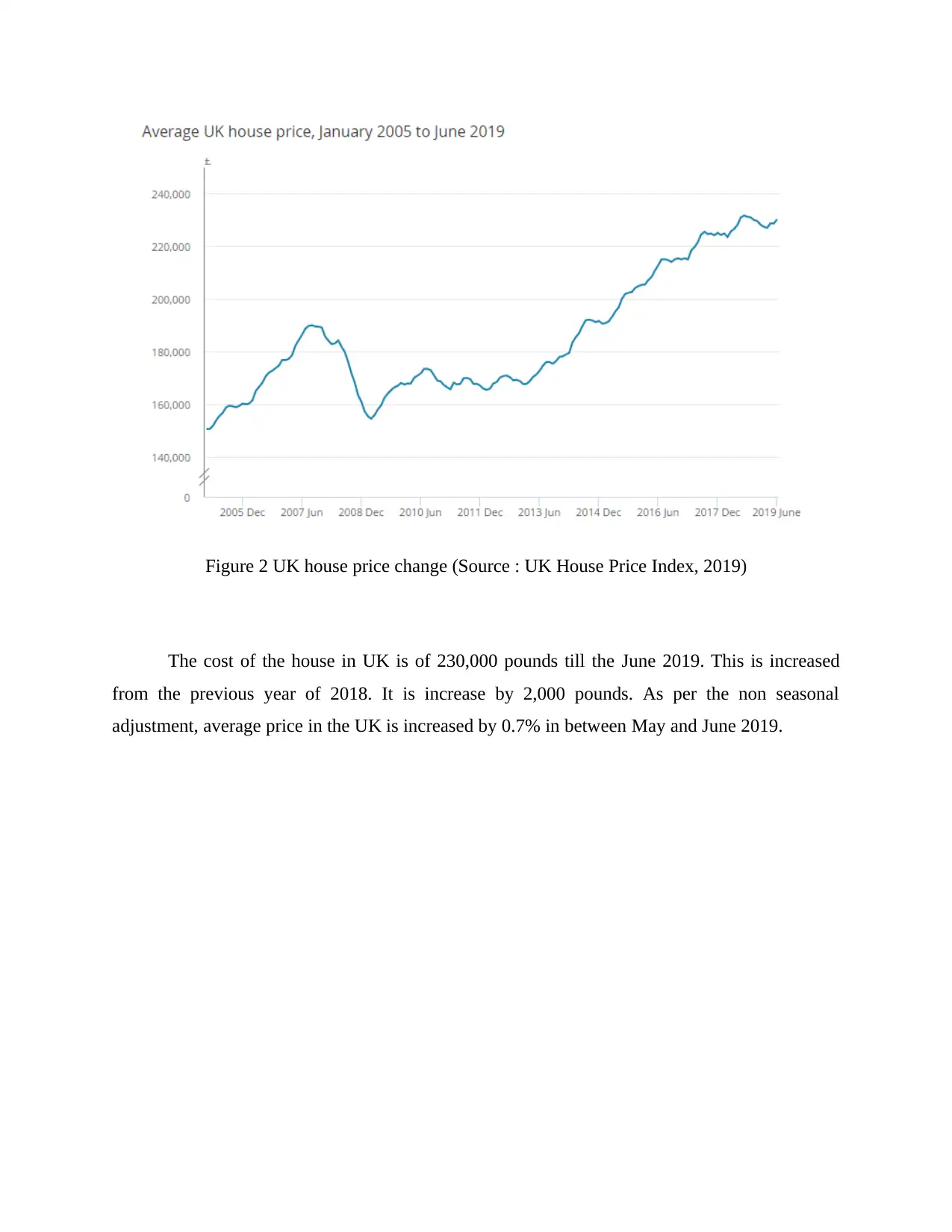
Figure 2 UK house price change (Source : UK House Price Index, 2019)
The cost of the house in UK is of 230,000 pounds till the June 2019. This is increased
from the previous year of 2018. It is increase by 2,000 pounds. As per the non seasonal
adjustment, average price in the UK is increased by 0.7% in between May and June 2019.
The cost of the house in UK is of 230,000 pounds till the June 2019. This is increased
from the previous year of 2018. It is increase by 2,000 pounds. As per the non seasonal
adjustment, average price in the UK is increased by 0.7% in between May and June 2019.
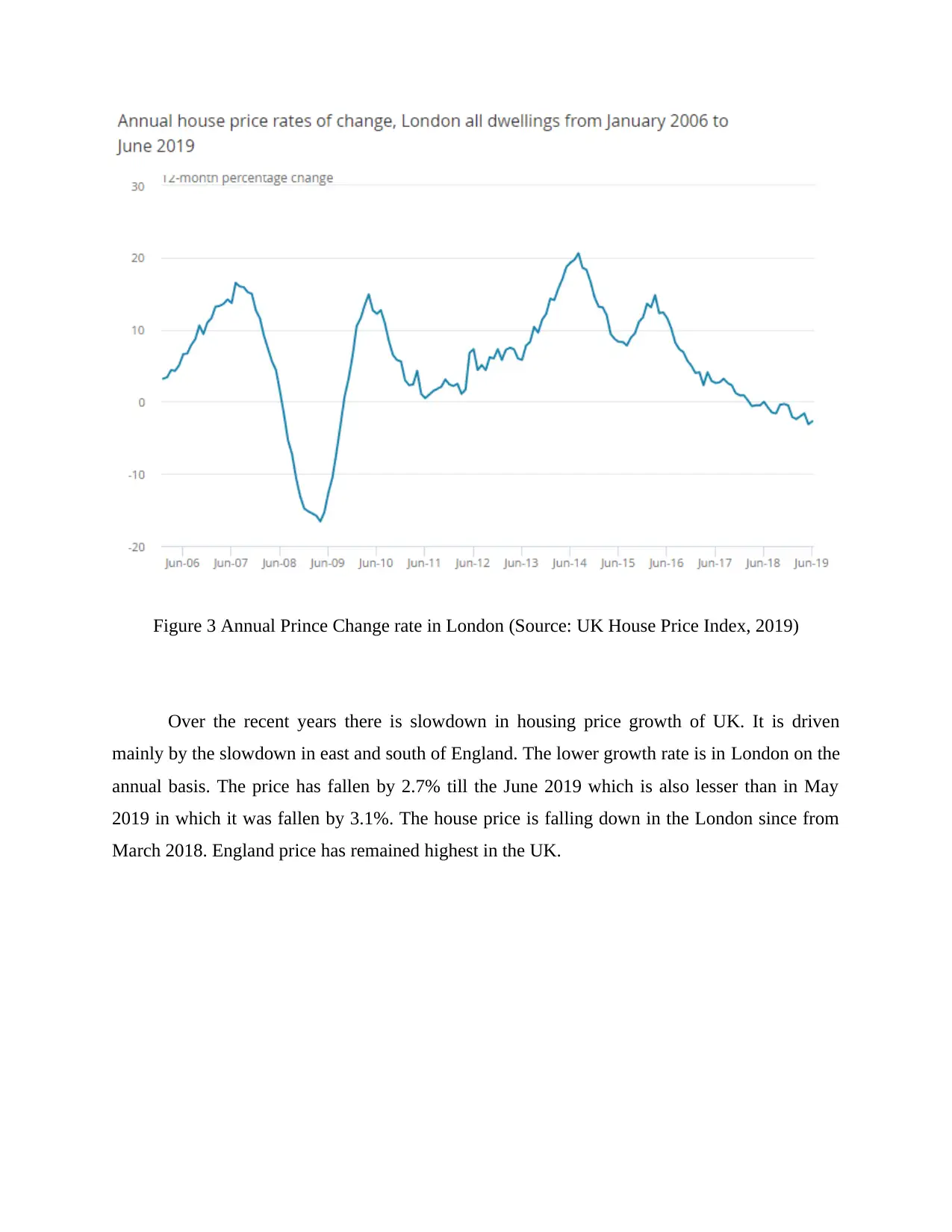
Figure 3 Annual Prince Change rate in London (Source: UK House Price Index, 2019)
Over the recent years there is slowdown in housing price growth of UK. It is driven
mainly by the slowdown in east and south of England. The lower growth rate is in London on the
annual basis. The price has fallen by 2.7% till the June 2019 which is also lesser than in May
2019 in which it was fallen by 3.1%. The house price is falling down in the London since from
March 2018. England price has remained highest in the UK.
Over the recent years there is slowdown in housing price growth of UK. It is driven
mainly by the slowdown in east and south of England. The lower growth rate is in London on the
annual basis. The price has fallen by 2.7% till the June 2019 which is also lesser than in May
2019 in which it was fallen by 3.1%. The house price is falling down in the London since from
March 2018. England price has remained highest in the UK.
⊘ This is a preview!⊘
Do you want full access?
Subscribe today to unlock all pages.

Trusted by 1+ million students worldwide
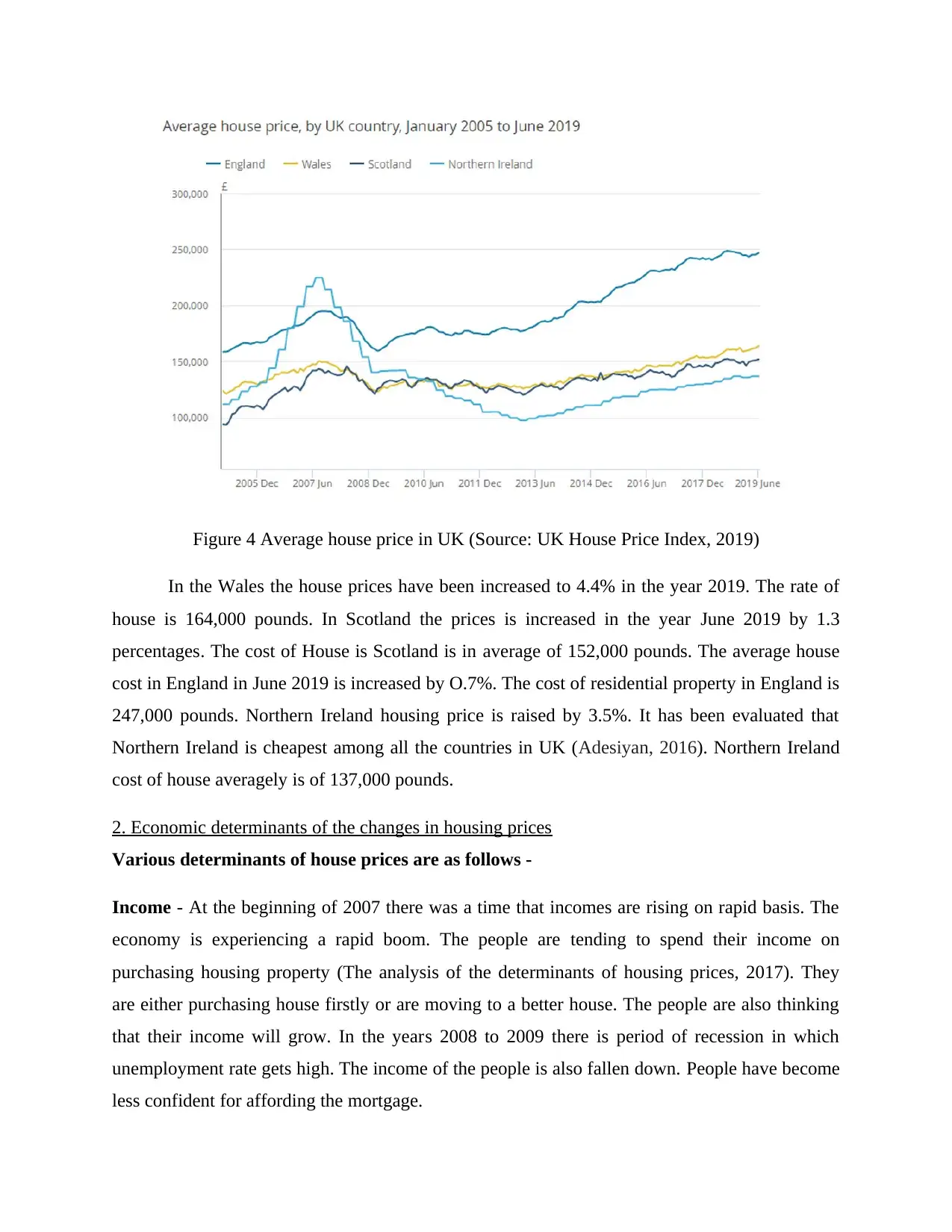
Figure 4 Average house price in UK (Source: UK House Price Index, 2019)
In the Wales the house prices have been increased to 4.4% in the year 2019. The rate of
house is 164,000 pounds. In Scotland the prices is increased in the year June 2019 by 1.3
percentages. The cost of House is Scotland is in average of 152,000 pounds. The average house
cost in England in June 2019 is increased by O.7%. The cost of residential property in England is
247,000 pounds. Northern Ireland housing price is raised by 3.5%. It has been evaluated that
Northern Ireland is cheapest among all the countries in UK (Adesiyan, 2016). Northern Ireland
cost of house averagely is of 137,000 pounds.
2. Economic determinants of the changes in housing prices
Various determinants of house prices are as follows -
Income - At the beginning of 2007 there was a time that incomes are rising on rapid basis. The
economy is experiencing a rapid boom. The people are tending to spend their income on
purchasing housing property (The analysis of the determinants of housing prices, 2017). They
are either purchasing house firstly or are moving to a better house. The people are also thinking
that their income will grow. In the years 2008 to 2009 there is period of recession in which
unemployment rate gets high. The income of the people is also fallen down. People have become
less confident for affording the mortgage.
In the Wales the house prices have been increased to 4.4% in the year 2019. The rate of
house is 164,000 pounds. In Scotland the prices is increased in the year June 2019 by 1.3
percentages. The cost of House is Scotland is in average of 152,000 pounds. The average house
cost in England in June 2019 is increased by O.7%. The cost of residential property in England is
247,000 pounds. Northern Ireland housing price is raised by 3.5%. It has been evaluated that
Northern Ireland is cheapest among all the countries in UK (Adesiyan, 2016). Northern Ireland
cost of house averagely is of 137,000 pounds.
2. Economic determinants of the changes in housing prices
Various determinants of house prices are as follows -
Income - At the beginning of 2007 there was a time that incomes are rising on rapid basis. The
economy is experiencing a rapid boom. The people are tending to spend their income on
purchasing housing property (The analysis of the determinants of housing prices, 2017). They
are either purchasing house firstly or are moving to a better house. The people are also thinking
that their income will grow. In the years 2008 to 2009 there is period of recession in which
unemployment rate gets high. The income of the people is also fallen down. People have become
less confident for affording the mortgage.
Paraphrase This Document
Need a fresh take? Get an instant paraphrase of this document with our AI Paraphraser
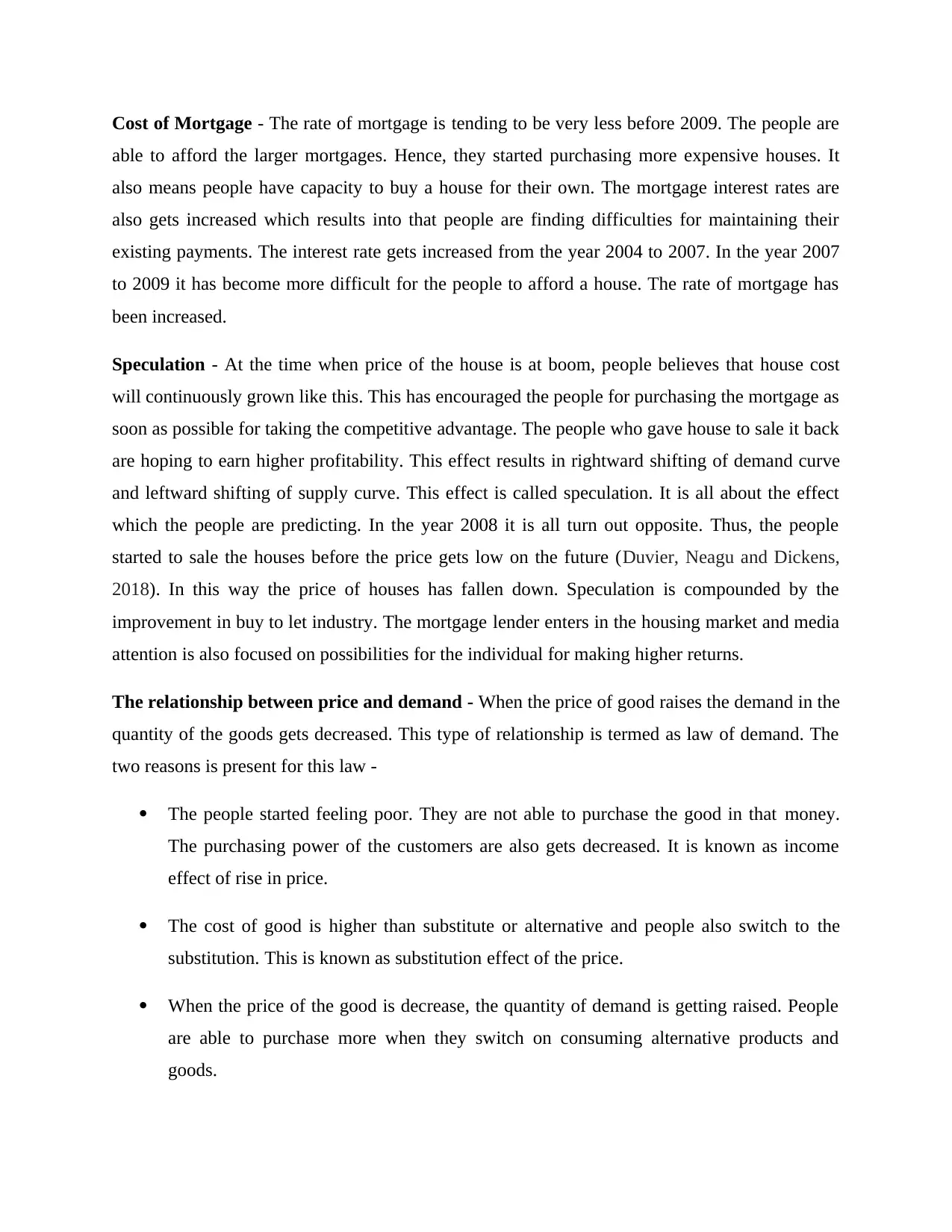
Cost of Mortgage - The rate of mortgage is tending to be very less before 2009. The people are
able to afford the larger mortgages. Hence, they started purchasing more expensive houses. It
also means people have capacity to buy a house for their own. The mortgage interest rates are
also gets increased which results into that people are finding difficulties for maintaining their
existing payments. The interest rate gets increased from the year 2004 to 2007. In the year 2007
to 2009 it has become more difficult for the people to afford a house. The rate of mortgage has
been increased.
Speculation - At the time when price of the house is at boom, people believes that house cost
will continuously grown like this. This has encouraged the people for purchasing the mortgage as
soon as possible for taking the competitive advantage. The people who gave house to sale it back
are hoping to earn higher profitability. This effect results in rightward shifting of demand curve
and leftward shifting of supply curve. This effect is called speculation. It is all about the effect
which the people are predicting. In the year 2008 it is all turn out opposite. Thus, the people
started to sale the houses before the price gets low on the future (Duvier, Neagu and Dickens,
2018). In this way the price of houses has fallen down. Speculation is compounded by the
improvement in buy to let industry. The mortgage lender enters in the housing market and media
attention is also focused on possibilities for the individual for making higher returns.
The relationship between price and demand - When the price of good raises the demand in the
quantity of the goods gets decreased. This type of relationship is termed as law of demand. The
two reasons is present for this law -
The people started feeling poor. They are not able to purchase the good in that money.
The purchasing power of the customers are also gets decreased. It is known as income
effect of rise in price.
The cost of good is higher than substitute or alternative and people also switch to the
substitution. This is known as substitution effect of the price.
When the price of the good is decrease, the quantity of demand is getting raised. People
are able to purchase more when they switch on consuming alternative products and
goods.
able to afford the larger mortgages. Hence, they started purchasing more expensive houses. It
also means people have capacity to buy a house for their own. The mortgage interest rates are
also gets increased which results into that people are finding difficulties for maintaining their
existing payments. The interest rate gets increased from the year 2004 to 2007. In the year 2007
to 2009 it has become more difficult for the people to afford a house. The rate of mortgage has
been increased.
Speculation - At the time when price of the house is at boom, people believes that house cost
will continuously grown like this. This has encouraged the people for purchasing the mortgage as
soon as possible for taking the competitive advantage. The people who gave house to sale it back
are hoping to earn higher profitability. This effect results in rightward shifting of demand curve
and leftward shifting of supply curve. This effect is called speculation. It is all about the effect
which the people are predicting. In the year 2008 it is all turn out opposite. Thus, the people
started to sale the houses before the price gets low on the future (Duvier, Neagu and Dickens,
2018). In this way the price of houses has fallen down. Speculation is compounded by the
improvement in buy to let industry. The mortgage lender enters in the housing market and media
attention is also focused on possibilities for the individual for making higher returns.
The relationship between price and demand - When the price of good raises the demand in the
quantity of the goods gets decreased. This type of relationship is termed as law of demand. The
two reasons is present for this law -
The people started feeling poor. They are not able to purchase the good in that money.
The purchasing power of the customers are also gets decreased. It is known as income
effect of rise in price.
The cost of good is higher than substitute or alternative and people also switch to the
substitution. This is known as substitution effect of the price.
When the price of the good is decrease, the quantity of demand is getting raised. People
are able to purchase more when they switch on consuming alternative products and
goods.
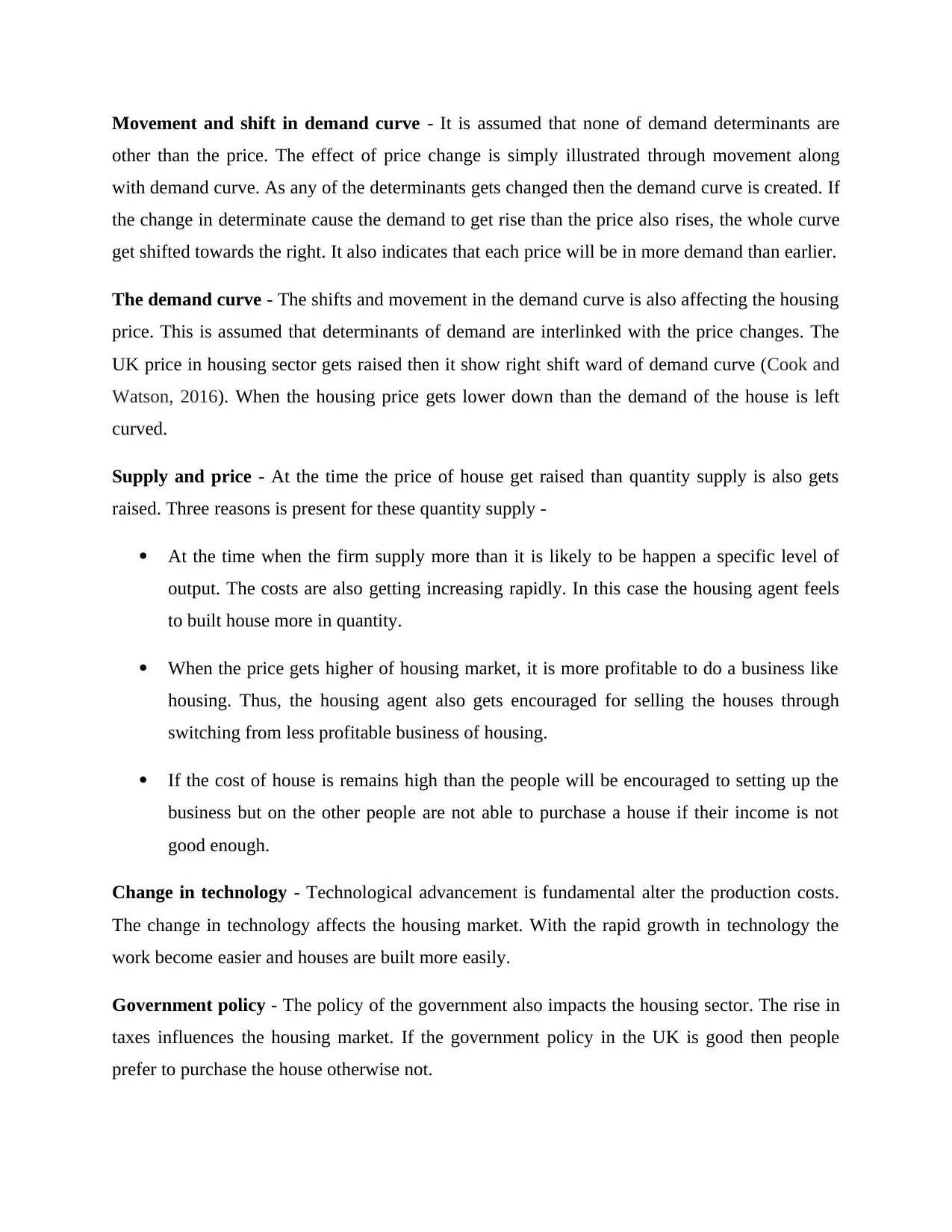
Movement and shift in demand curve - It is assumed that none of demand determinants are
other than the price. The effect of price change is simply illustrated through movement along
with demand curve. As any of the determinants gets changed then the demand curve is created. If
the change in determinate cause the demand to get rise than the price also rises, the whole curve
get shifted towards the right. It also indicates that each price will be in more demand than earlier.
The demand curve - The shifts and movement in the demand curve is also affecting the housing
price. This is assumed that determinants of demand are interlinked with the price changes. The
UK price in housing sector gets raised then it show right shift ward of demand curve (Cook and
Watson, 2016). When the housing price gets lower down than the demand of the house is left
curved.
Supply and price - At the time the price of house get raised than quantity supply is also gets
raised. Three reasons is present for these quantity supply -
At the time when the firm supply more than it is likely to be happen a specific level of
output. The costs are also getting increasing rapidly. In this case the housing agent feels
to built house more in quantity.
When the price gets higher of housing market, it is more profitable to do a business like
housing. Thus, the housing agent also gets encouraged for selling the houses through
switching from less profitable business of housing.
If the cost of house is remains high than the people will be encouraged to setting up the
business but on the other people are not able to purchase a house if their income is not
good enough.
Change in technology - Technological advancement is fundamental alter the production costs.
The change in technology affects the housing market. With the rapid growth in technology the
work become easier and houses are built more easily.
Government policy - The policy of the government also impacts the housing sector. The rise in
taxes influences the housing market. If the government policy in the UK is good then people
prefer to purchase the house otherwise not.
other than the price. The effect of price change is simply illustrated through movement along
with demand curve. As any of the determinants gets changed then the demand curve is created. If
the change in determinate cause the demand to get rise than the price also rises, the whole curve
get shifted towards the right. It also indicates that each price will be in more demand than earlier.
The demand curve - The shifts and movement in the demand curve is also affecting the housing
price. This is assumed that determinants of demand are interlinked with the price changes. The
UK price in housing sector gets raised then it show right shift ward of demand curve (Cook and
Watson, 2016). When the housing price gets lower down than the demand of the house is left
curved.
Supply and price - At the time the price of house get raised than quantity supply is also gets
raised. Three reasons is present for these quantity supply -
At the time when the firm supply more than it is likely to be happen a specific level of
output. The costs are also getting increasing rapidly. In this case the housing agent feels
to built house more in quantity.
When the price gets higher of housing market, it is more profitable to do a business like
housing. Thus, the housing agent also gets encouraged for selling the houses through
switching from less profitable business of housing.
If the cost of house is remains high than the people will be encouraged to setting up the
business but on the other people are not able to purchase a house if their income is not
good enough.
Change in technology - Technological advancement is fundamental alter the production costs.
The change in technology affects the housing market. With the rapid growth in technology the
work become easier and houses are built more easily.
Government policy - The policy of the government also impacts the housing sector. The rise in
taxes influences the housing market. If the government policy in the UK is good then people
prefer to purchase the house otherwise not.
⊘ This is a preview!⊘
Do you want full access?
Subscribe today to unlock all pages.

Trusted by 1+ million students worldwide
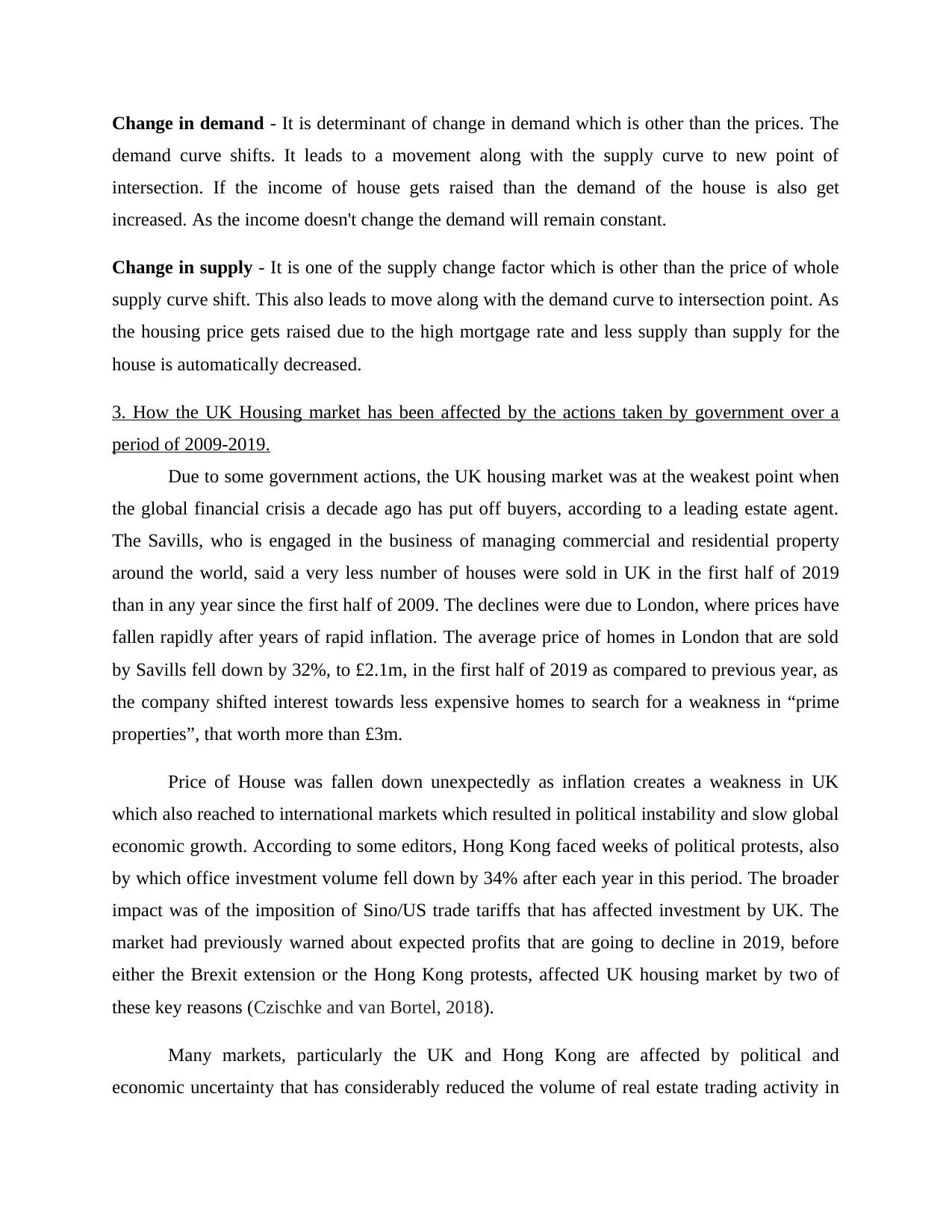
Change in demand - It is determinant of change in demand which is other than the prices. The
demand curve shifts. It leads to a movement along with the supply curve to new point of
intersection. If the income of house gets raised than the demand of the house is also get
increased. As the income doesn't change the demand will remain constant.
Change in supply - It is one of the supply change factor which is other than the price of whole
supply curve shift. This also leads to move along with the demand curve to intersection point. As
the housing price gets raised due to the high mortgage rate and less supply than supply for the
house is automatically decreased.
3. How the UK Housing market has been affected by the actions taken by government over a
period of 2009-2019.
Due to some government actions, the UK housing market was at the weakest point when
the global financial crisis a decade ago has put off buyers, according to a leading estate agent.
The Savills, who is engaged in the business of managing commercial and residential property
around the world, said a very less number of houses were sold in UK in the first half of 2019
than in any year since the first half of 2009. The declines were due to London, where prices have
fallen rapidly after years of rapid inflation. The average price of homes in London that are sold
by Savills fell down by 32%, to £2.1m, in the first half of 2019 as compared to previous year, as
the company shifted interest towards less expensive homes to search for a weakness in “prime
properties”, that worth more than £3m.
Price of House was fallen down unexpectedly as inflation creates a weakness in UK
which also reached to international markets which resulted in political instability and slow global
economic growth. According to some editors, Hong Kong faced weeks of political protests, also
by which office investment volume fell down by 34% after each year in this period. The broader
impact was of the imposition of Sino/US trade tariffs that has affected investment by UK. The
market had previously warned about expected profits that are going to decline in 2019, before
either the Brexit extension or the Hong Kong protests, affected UK housing market by two of
these key reasons (Czischke and van Bortel, 2018).
Many markets, particularly the UK and Hong Kong are affected by political and
economic uncertainty that has considerably reduced the volume of real estate trading activity in
demand curve shifts. It leads to a movement along with the supply curve to new point of
intersection. If the income of house gets raised than the demand of the house is also get
increased. As the income doesn't change the demand will remain constant.
Change in supply - It is one of the supply change factor which is other than the price of whole
supply curve shift. This also leads to move along with the demand curve to intersection point. As
the housing price gets raised due to the high mortgage rate and less supply than supply for the
house is automatically decreased.
3. How the UK Housing market has been affected by the actions taken by government over a
period of 2009-2019.
Due to some government actions, the UK housing market was at the weakest point when
the global financial crisis a decade ago has put off buyers, according to a leading estate agent.
The Savills, who is engaged in the business of managing commercial and residential property
around the world, said a very less number of houses were sold in UK in the first half of 2019
than in any year since the first half of 2009. The declines were due to London, where prices have
fallen rapidly after years of rapid inflation. The average price of homes in London that are sold
by Savills fell down by 32%, to £2.1m, in the first half of 2019 as compared to previous year, as
the company shifted interest towards less expensive homes to search for a weakness in “prime
properties”, that worth more than £3m.
Price of House was fallen down unexpectedly as inflation creates a weakness in UK
which also reached to international markets which resulted in political instability and slow global
economic growth. According to some editors, Hong Kong faced weeks of political protests, also
by which office investment volume fell down by 34% after each year in this period. The broader
impact was of the imposition of Sino/US trade tariffs that has affected investment by UK. The
market had previously warned about expected profits that are going to decline in 2019, before
either the Brexit extension or the Hong Kong protests, affected UK housing market by two of
these key reasons (Czischke and van Bortel, 2018).
Many markets, particularly the UK and Hong Kong are affected by political and
economic uncertainty that has considerably reduced the volume of real estate trading activity in
Paraphrase This Document
Need a fresh take? Get an instant paraphrase of this document with our AI Paraphraser
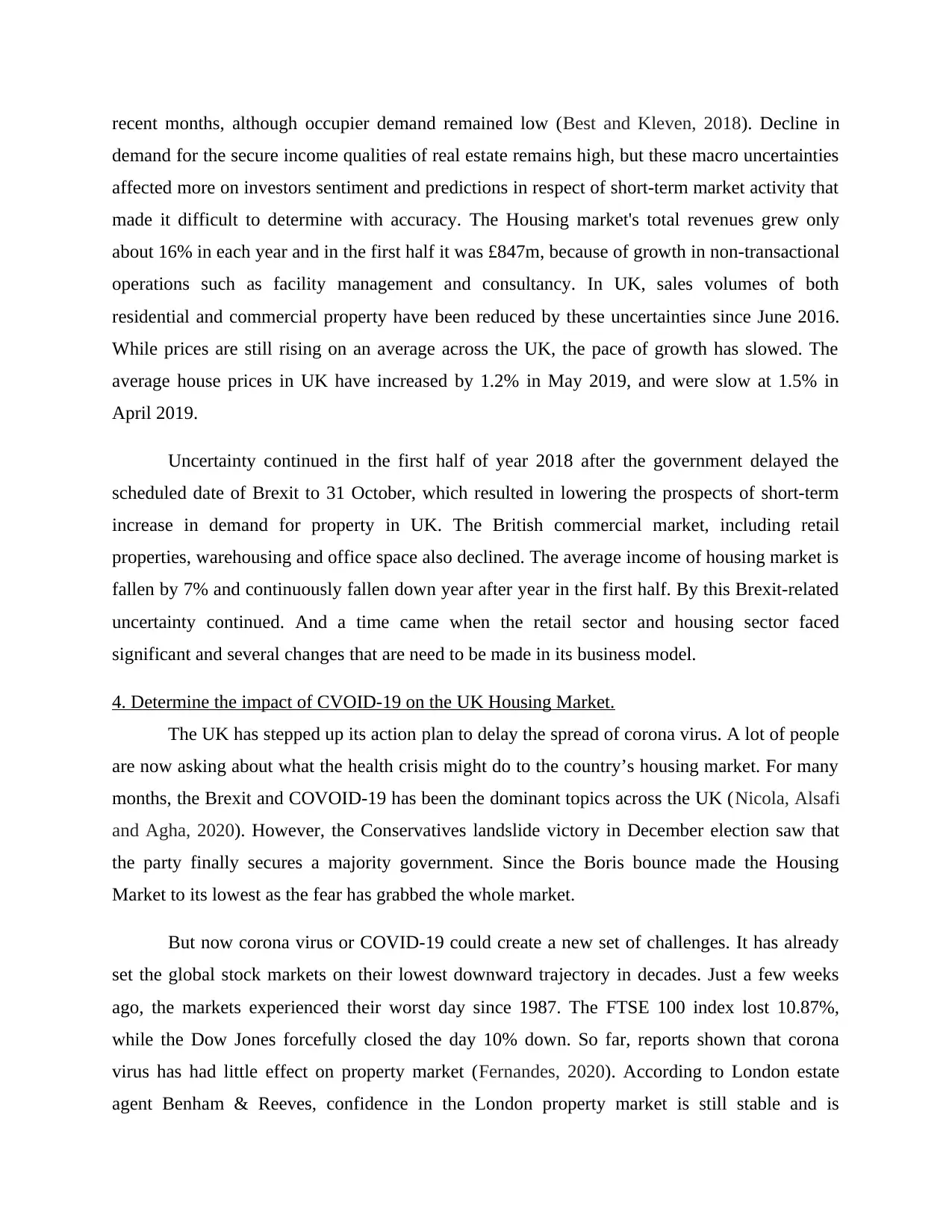
recent months, although occupier demand remained low (Best and Kleven, 2018). Decline in
demand for the secure income qualities of real estate remains high, but these macro uncertainties
affected more on investors sentiment and predictions in respect of short-term market activity that
made it difficult to determine with accuracy. The Housing market's total revenues grew only
about 16% in each year and in the first half it was £847m, because of growth in non-transactional
operations such as facility management and consultancy. In UK, sales volumes of both
residential and commercial property have been reduced by these uncertainties since June 2016.
While prices are still rising on an average across the UK, the pace of growth has slowed. The
average house prices in UK have increased by 1.2% in May 2019, and were slow at 1.5% in
April 2019.
Uncertainty continued in the first half of year 2018 after the government delayed the
scheduled date of Brexit to 31 October, which resulted in lowering the prospects of short-term
increase in demand for property in UK. The British commercial market, including retail
properties, warehousing and office space also declined. The average income of housing market is
fallen by 7% and continuously fallen down year after year in the first half. By this Brexit-related
uncertainty continued. And a time came when the retail sector and housing sector faced
significant and several changes that are need to be made in its business model.
4. Determine the impact of CVOID-19 on the UK Housing Market.
The UK has stepped up its action plan to delay the spread of corona virus. A lot of people
are now asking about what the health crisis might do to the country’s housing market. For many
months, the Brexit and COVOID-19 has been the dominant topics across the UK (Nicola, Alsafi
and Agha, 2020). However, the Conservatives landslide victory in December election saw that
the party finally secures a majority government. Since the Boris bounce made the Housing
Market to its lowest as the fear has grabbed the whole market.
But now corona virus or COVID-19 could create a new set of challenges. It has already
set the global stock markets on their lowest downward trajectory in decades. Just a few weeks
ago, the markets experienced their worst day since 1987. The FTSE 100 index lost 10.87%,
while the Dow Jones forcefully closed the day 10% down. So far, reports shown that corona
virus has had little effect on property market (Fernandes, 2020). According to London estate
agent Benham & Reeves, confidence in the London property market is still stable and is
demand for the secure income qualities of real estate remains high, but these macro uncertainties
affected more on investors sentiment and predictions in respect of short-term market activity that
made it difficult to determine with accuracy. The Housing market's total revenues grew only
about 16% in each year and in the first half it was £847m, because of growth in non-transactional
operations such as facility management and consultancy. In UK, sales volumes of both
residential and commercial property have been reduced by these uncertainties since June 2016.
While prices are still rising on an average across the UK, the pace of growth has slowed. The
average house prices in UK have increased by 1.2% in May 2019, and were slow at 1.5% in
April 2019.
Uncertainty continued in the first half of year 2018 after the government delayed the
scheduled date of Brexit to 31 October, which resulted in lowering the prospects of short-term
increase in demand for property in UK. The British commercial market, including retail
properties, warehousing and office space also declined. The average income of housing market is
fallen by 7% and continuously fallen down year after year in the first half. By this Brexit-related
uncertainty continued. And a time came when the retail sector and housing sector faced
significant and several changes that are need to be made in its business model.
4. Determine the impact of CVOID-19 on the UK Housing Market.
The UK has stepped up its action plan to delay the spread of corona virus. A lot of people
are now asking about what the health crisis might do to the country’s housing market. For many
months, the Brexit and COVOID-19 has been the dominant topics across the UK (Nicola, Alsafi
and Agha, 2020). However, the Conservatives landslide victory in December election saw that
the party finally secures a majority government. Since the Boris bounce made the Housing
Market to its lowest as the fear has grabbed the whole market.
But now corona virus or COVID-19 could create a new set of challenges. It has already
set the global stock markets on their lowest downward trajectory in decades. Just a few weeks
ago, the markets experienced their worst day since 1987. The FTSE 100 index lost 10.87%,
while the Dow Jones forcefully closed the day 10% down. So far, reports shown that corona
virus has had little effect on property market (Fernandes, 2020). According to London estate
agent Benham & Reeves, confidence in the London property market is still stable and is
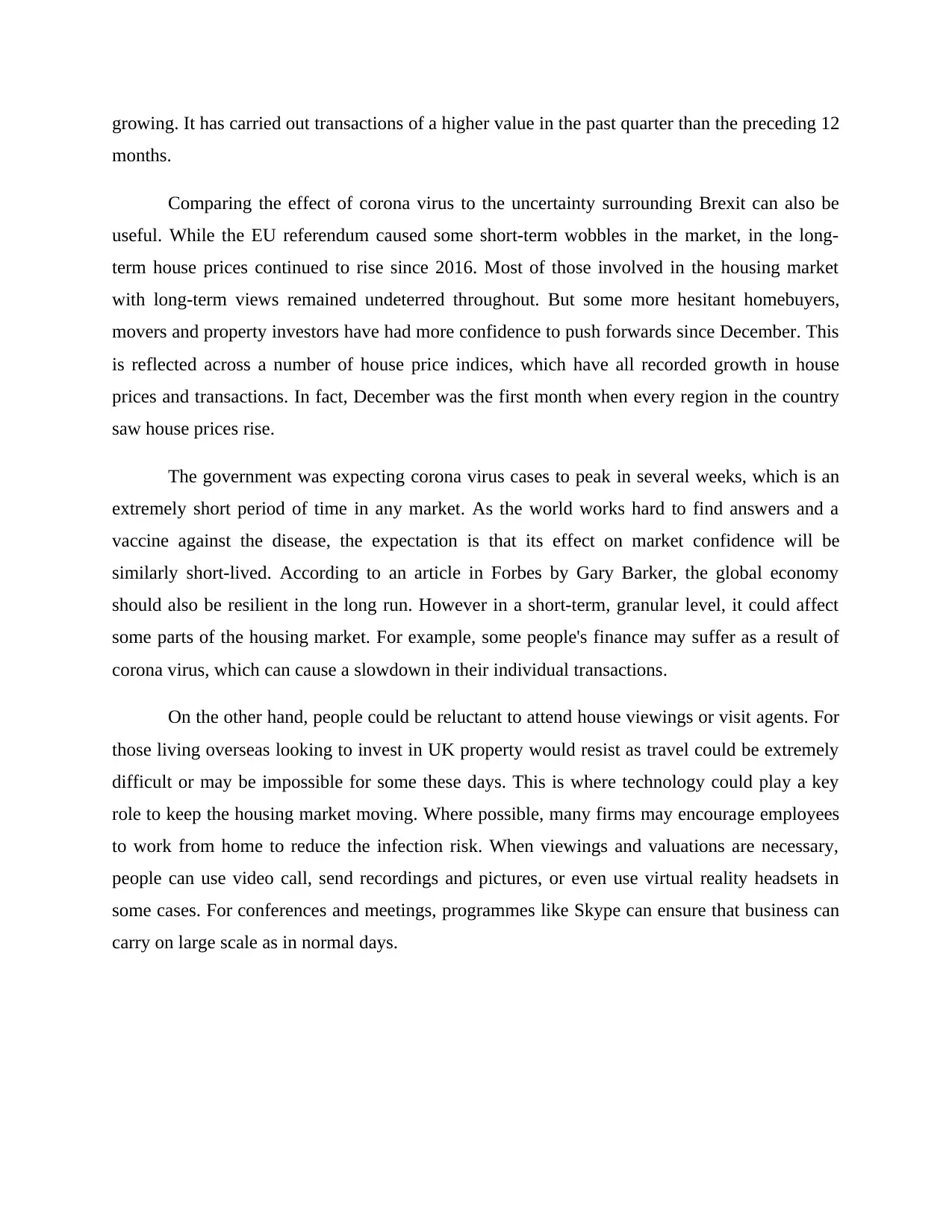
growing. It has carried out transactions of a higher value in the past quarter than the preceding 12
months.
Comparing the effect of corona virus to the uncertainty surrounding Brexit can also be
useful. While the EU referendum caused some short-term wobbles in the market, in the long-
term house prices continued to rise since 2016. Most of those involved in the housing market
with long-term views remained undeterred throughout. But some more hesitant homebuyers,
movers and property investors have had more confidence to push forwards since December. This
is reflected across a number of house price indices, which have all recorded growth in house
prices and transactions. In fact, December was the first month when every region in the country
saw house prices rise.
The government was expecting corona virus cases to peak in several weeks, which is an
extremely short period of time in any market. As the world works hard to find answers and a
vaccine against the disease, the expectation is that its effect on market confidence will be
similarly short-lived. According to an article in Forbes by Gary Barker, the global economy
should also be resilient in the long run. However in a short-term, granular level, it could affect
some parts of the housing market. For example, some people's finance may suffer as a result of
corona virus, which can cause a slowdown in their individual transactions.
On the other hand, people could be reluctant to attend house viewings or visit agents. For
those living overseas looking to invest in UK property would resist as travel could be extremely
difficult or may be impossible for some these days. This is where technology could play a key
role to keep the housing market moving. Where possible, many firms may encourage employees
to work from home to reduce the infection risk. When viewings and valuations are necessary,
people can use video call, send recordings and pictures, or even use virtual reality headsets in
some cases. For conferences and meetings, programmes like Skype can ensure that business can
carry on large scale as in normal days.
months.
Comparing the effect of corona virus to the uncertainty surrounding Brexit can also be
useful. While the EU referendum caused some short-term wobbles in the market, in the long-
term house prices continued to rise since 2016. Most of those involved in the housing market
with long-term views remained undeterred throughout. But some more hesitant homebuyers,
movers and property investors have had more confidence to push forwards since December. This
is reflected across a number of house price indices, which have all recorded growth in house
prices and transactions. In fact, December was the first month when every region in the country
saw house prices rise.
The government was expecting corona virus cases to peak in several weeks, which is an
extremely short period of time in any market. As the world works hard to find answers and a
vaccine against the disease, the expectation is that its effect on market confidence will be
similarly short-lived. According to an article in Forbes by Gary Barker, the global economy
should also be resilient in the long run. However in a short-term, granular level, it could affect
some parts of the housing market. For example, some people's finance may suffer as a result of
corona virus, which can cause a slowdown in their individual transactions.
On the other hand, people could be reluctant to attend house viewings or visit agents. For
those living overseas looking to invest in UK property would resist as travel could be extremely
difficult or may be impossible for some these days. This is where technology could play a key
role to keep the housing market moving. Where possible, many firms may encourage employees
to work from home to reduce the infection risk. When viewings and valuations are necessary,
people can use video call, send recordings and pictures, or even use virtual reality headsets in
some cases. For conferences and meetings, programmes like Skype can ensure that business can
carry on large scale as in normal days.
⊘ This is a preview!⊘
Do you want full access?
Subscribe today to unlock all pages.

Trusted by 1+ million students worldwide
1 out of 16